 7 citations,
October 2019 in “Klinická onkologie”
7 citations,
October 2019 in “Klinická onkologie” Cancer treatments often cause hair loss and damage, affecting patients' mental health.
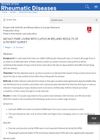
Lupus severely affects daily life, work, and mental health, with many experiencing frequent flares and medication side-effects.
 January 2023 in “Brazilian Journals Editora eBooks”
January 2023 in “Brazilian Journals Editora eBooks” The document concludes that Passiflora incarnata may help with anxiety, healthcare workers need mental support, common bacteria cause hospital UTIs, telehealth for heart failure needs research, kids' screen time has increased, pregnant teens are mostly okay with their body image, diagnosing post-surgery tuberculosis is hard, older and severely ill people are more likely to have long COVID symptoms, and psychiatrists should be part of pain management teams.
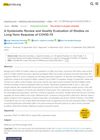
COVID-19 can cause long-term lung, skin, and mental health problems, especially in women, people with other health issues, and those who had severe COVID-19.
 December 2018 in “Actas urológicas españolas”
December 2018 in “Actas urológicas españolas” 5-alpha reductase inhibitors may have additional effects on cancer, mental health, heart health, and hormone levels beyond treating prostate enlargement.
37 citations,
December 2005 in “International Journal of Clinical Practice” Choose acne treatments based on appearance, lesion type, severity, scarring, and mental impact.
 14 citations,
October 2021 in “Journal of Pediatric and Adolescent Gynecology”
14 citations,
October 2021 in “Journal of Pediatric and Adolescent Gynecology” In teens with Polycystic Ovary Syndrome and obesity, issues related to metabolism, skin, and mental health are common, and a clinic with various specialists can provide care for most of these problems.
 3 citations,
January 2018 in “İstanbul Kuzey Klinikleri”
3 citations,
January 2018 in “İstanbul Kuzey Klinikleri” Hair loss was found in 37.4% of surveyed rural high-school students in Eskisehir, Turkey, affecting their quality of life, especially in general health and mental well-being.
 March 2012 in “Pathy's Principles and Practice of Geriatric Medicine”
March 2012 in “Pathy's Principles and Practice of Geriatric Medicine” Older adults often have skin problems due to aging, and treating these conditions requires attention to both physical and mental health.
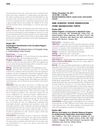
The man's scalp tightness after hair surgery affects his life and work, and it's unclear if it's due to the surgery or a mental health issue.
 October 2019 in “International journal of clinical & experimental dermatology”
October 2019 in “International journal of clinical & experimental dermatology” Female pattern hair loss greatly affects quality of life, especially in younger patients, those with the condition for a long time, and those with mental health issues. A more comprehensive treatment approach is suggested.
 43 citations,
January 2016 in “International Journal of Andrology”
43 citations,
January 2016 in “International Journal of Andrology” Finasteride caused long-term sexual and non-sexual side effects in young men with hair loss.
30 citations,
January 2020 in “Fertility and Sterility” Finasteride can cause serious side effects in some men, needing more research for treatment.
 1 citations,
August 2021 in “Canadian journal of neurological sciences”
1 citations,
August 2021 in “Canadian journal of neurological sciences” Woodhouse-Sakati syndrome can cause writer's cramp and other varied symptoms, highlighting the importance of genetic testing for diagnosis.
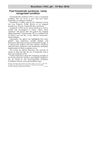 March 2016 in “Reactions Weekly”
March 2016 in “Reactions Weekly” Post-finasteride syndrome causes various symptoms in men using finasteride, with no known cure.
 4 citations,
November 2023 in “Acta obstetricia et gynecologica Scandinavica”
4 citations,
November 2023 in “Acta obstetricia et gynecologica Scandinavica” The guideline refines PCOS diagnosis, promotes a healthy lifestyle, reviews treatments, and stresses long-term follow-up.
 5 citations,
May 2011 in “European Journal of Medical Genetics”
5 citations,
May 2011 in “European Journal of Medical Genetics” A genetic duplication on chromosome 5 was linked to a woman's unique combination of medical conditions.
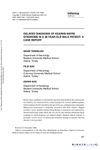 2 citations,
January 2008 in “International Journal of Neuroscience”
2 citations,
January 2008 in “International Journal of Neuroscience” A 38-year-old man was diagnosed late with Kearns-Sayre syndrome after being wrongly treated for epilepsy.
 1 citations,
January 2023 in “Brazilian Journals Editora eBooks”
1 citations,
January 2023 in “Brazilian Journals Editora eBooks” Children's screen time increased during the pandemic, causing various health issues.
 September 2021 in “Journal of skin and stem cell”
September 2021 in “Journal of skin and stem cell” Lactium, a milk protein, can help reduce symptoms of skin disorders linked to stress and anxiety without side effects.
 April 2021 in “Sohag Medical Journal”
April 2021 in “Sohag Medical Journal” Alopecia areata is an autoimmune condition causing hair loss, linked to genetic factors and immune system issues, with no cure yet.
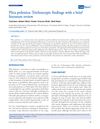 January 2021 in “Nasza Dermatologia Online”
January 2021 in “Nasza Dermatologia Online” Plica polonica is a rare condition where hair becomes irreversibly tangled, and the treatment is to cut the matted hair.

People with psoriasis have more health problems, including autoimmune diseases, than those without it.
 January 1953 in “The Lancet”
January 1953 in “The Lancet” Alopecia areata's causes are unclear, treatments exist but relapses are common.
 December 1920 in “The Lancet”
December 1920 in “The Lancet” The document discusses various public health initiatives and societal issues, emphasizing early intervention and support.
 101 citations,
May 2014 in “PLOS ONE”
101 citations,
May 2014 in “PLOS ONE” Women with PCOS have a higher chance of experiencing depression, anxiety, and sleep disorders.
72 citations,
October 1988 in “Archives of Disease in Childhood” Biotin treatment improves symptoms of biotinidase deficiency, but some neurological damage may be permanent.
 26 citations,
September 2009 in “Psychosomatics”
26 citations,
September 2009 in “Psychosomatics” A girl initially thought to have a psychiatric disorder was later found to have a lupus-related condition, which improved with proper treatment.
 25 citations,
February 2017 in “Anticancer Research/Anticancer research”
25 citations,
February 2017 in “Anticancer Research/Anticancer research” Ozone therapy might improve cancer treatment and reduce its side effects.
 6 citations,
February 2004 in “Clinical and Experimental Ophthalmology”
6 citations,
February 2004 in “Clinical and Experimental Ophthalmology” The document concludes that careful diagnosis is crucial for chromosome 13q deletion syndrome, tamoxifen can cause reversible eye damage, finasteride may be linked to cataracts, and OCT is useful for diagnosing macular diseases.



























